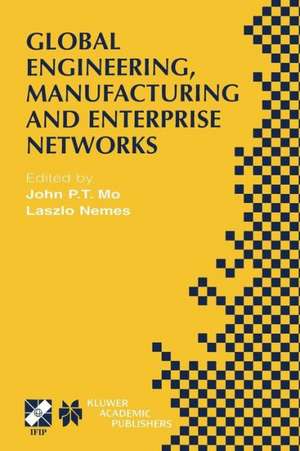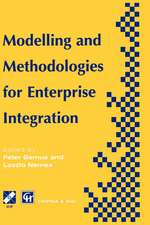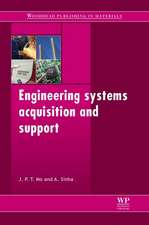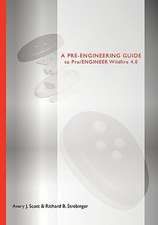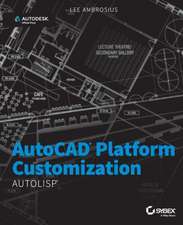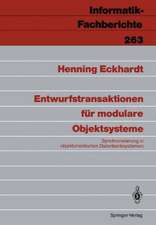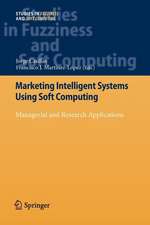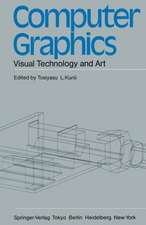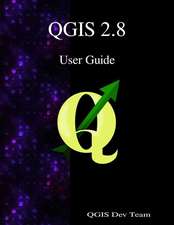Global Engineering, Manufacturing and Enterprise Networks: IFIP TC5 WG5.3/5.7/5.12 Fourth International Working Conference on the Design of Information Infrastructure Systems for Manufacturing (DIISM 2000). November 15–17, 2000, Melbourne, Victoria, Australia: IFIP Advances in Information and Communication Technology, cartea 63
Editat de John P.T. Mo, Laszlo Nemesen Limba Engleză Paperback – 26 iul 2012
| Toate formatele și edițiile | Preț | Express |
|---|---|---|
| Paperback (1) | 1282.50 lei 43-57 zile | |
| Springer Us – 26 iul 2012 | 1282.50 lei 43-57 zile | |
| Hardback (1) | 1288.94 lei 43-57 zile | |
| Springer Us – 31 mai 2001 | 1288.94 lei 43-57 zile |
Din seria IFIP Advances in Information and Communication Technology
- 20%
 Preț: 170.51 lei
Preț: 170.51 lei - 20%
 Preț: 615.74 lei
Preț: 615.74 lei - 20%
 Preț: 340.32 lei
Preț: 340.32 lei -
 Preț: 397.38 lei
Preț: 397.38 lei - 20%
 Preț: 336.02 lei
Preț: 336.02 lei - 20%
 Preț: 340.98 lei
Preț: 340.98 lei - 20%
 Preț: 503.41 lei
Preț: 503.41 lei - 17%
 Preț: 523.40 lei
Preț: 523.40 lei - 20%
 Preț: 502.06 lei
Preț: 502.06 lei - 17%
 Preț: 488.96 lei
Preț: 488.96 lei - 20%
 Preț: 501.04 lei
Preț: 501.04 lei - 20%
 Preț: 403.20 lei
Preț: 403.20 lei - 15%
 Preț: 708.83 lei
Preț: 708.83 lei - 20%
 Preț: 1162.12 lei
Preț: 1162.12 lei - 20%
 Preț: 1288.25 lei
Preț: 1288.25 lei - 18%
 Preț: 1227.21 lei
Preț: 1227.21 lei - 20%
 Preț: 1282.00 lei
Preț: 1282.00 lei - 18%
 Preț: 1224.18 lei
Preț: 1224.18 lei - 18%
 Preț: 953.03 lei
Preț: 953.03 lei - 18%
 Preț: 953.20 lei
Preț: 953.20 lei - 18%
 Preț: 944.99 lei
Preț: 944.99 lei - 18%
 Preț: 948.29 lei
Preț: 948.29 lei - 15%
 Preț: 645.47 lei
Preț: 645.47 lei - 18%
 Preț: 960.13 lei
Preț: 960.13 lei - 20%
 Preț: 1288.11 lei
Preț: 1288.11 lei - 20%
 Preț: 998.70 lei
Preț: 998.70 lei - 18%
 Preț: 949.23 lei
Preț: 949.23 lei - 20%
 Preț: 1283.81 lei
Preț: 1283.81 lei - 20%
 Preț: 995.89 lei
Preț: 995.89 lei - 15%
 Preț: 645.79 lei
Preț: 645.79 lei - 20%
 Preț: 1276.74 lei
Preț: 1276.74 lei - 20%
 Preț: 1922.99 lei
Preț: 1922.99 lei - 20%
 Preț: 1285.97 lei
Preț: 1285.97 lei - 18%
 Preț: 956.69 lei
Preț: 956.69 lei - 18%
 Preț: 946.72 lei
Preț: 946.72 lei - 18%
 Preț: 1224.36 lei
Preț: 1224.36 lei - 20%
 Preț: 1277.89 lei
Preț: 1277.89 lei - 18%
 Preț: 953.03 lei
Preț: 953.03 lei - 18%
 Preț: 947.98 lei
Preț: 947.98 lei - 20%
 Preț: 1292.54 lei
Preț: 1292.54 lei - 18%
 Preț: 956.18 lei
Preț: 956.18 lei - 20%
 Preț: 645.79 lei
Preț: 645.79 lei - 18%
 Preț: 1235.25 lei
Preț: 1235.25 lei - 20%
 Preț: 1284.47 lei
Preț: 1284.47 lei - 18%
 Preț: 1231.01 lei
Preț: 1231.01 lei - 20%
 Preț: 993.09 lei
Preț: 993.09 lei - 20%
 Preț: 1288.94 lei
Preț: 1288.94 lei - 20%
 Preț: 987.17 lei
Preț: 987.17 lei - 18%
 Preț: 1833.33 lei
Preț: 1833.33 lei
Preț: 1282.50 lei
Preț vechi: 1603.13 lei
-20% Nou
Puncte Express: 1924
Preț estimativ în valută:
245.41€ • 256.87$ • 204.26£
245.41€ • 256.87$ • 204.26£
Carte tipărită la comandă
Livrare economică 31 martie-14 aprilie
Preluare comenzi: 021 569.72.76
Specificații
ISBN-13: 9781475710120
ISBN-10: 1475710127
Pagini: 516
Ilustrații: XVI, 496 p.
Dimensiuni: 155 x 235 x 27 mm
Greutate: 0.72 kg
Ediția:Softcover reprint of the original 1st ed. 2001
Editura: Springer Us
Colecția Springer
Seria IFIP Advances in Information and Communication Technology
Locul publicării:New York, NY, United States
ISBN-10: 1475710127
Pagini: 516
Ilustrații: XVI, 496 p.
Dimensiuni: 155 x 235 x 27 mm
Greutate: 0.72 kg
Ediția:Softcover reprint of the original 1st ed. 2001
Editura: Springer Us
Colecția Springer
Seria IFIP Advances in Information and Communication Technology
Locul publicării:New York, NY, United States
Public țintă
ResearchCuprins
One Keynote.- Accessing Corporate Memory — Some Knowledge Structure Concepts.- Two Virtual Enterprises.- Virtual Enterprise Architecture and its Supporting Methods/Tools for Managing Supply Chain System Life Cycle.- Flexible Infrastructure for Virtual Enterprises.- Assessing Ability to Execute in Virtual Enterprises.- Project-specific Process Configuration in Virtual Enterprises.- Functional Requirements for Inter-enterprise Intranet Services.- The Architecture of an Internet-based Virtual Industrial Community.- From Single Enterprises to Complementary Networks.- Three Modelling and Analysis of Virtual Enterprises.- Use of GERAM as Basis for a Virtual Enterprise Framework Model.- The Component-oriented Approach towards Complex Product Development.- Supporting Partner Selection for Virtual Enterprises.- Specifying Interactions in Integrated Manufacturing Systems.- Modelling Semiosis of Design.- Modelling for Designing, Managing and Improving Virtual Enterprises in One-of-a-kind Business.- An Adaptive Process Management System (APMS).- Modelling Requirements for Self-integrating Manufacturing Systems.- Four Supply Chain Management.- Ergonomic Concerns in Enterprise Resource Planning (ERP) Systems and Its Implementations.- Low-cost System for Supply Chain Management.- A Booking Type Production System as a Collaboration Method for Virtual Enterprises.- Collaborative Design Procedure for Supply Chain Process Integration Using UML.- Agent-based Architecture for Flexible Lean Cell Design, Analysis and Evaluation.- Supply Chain Business System Reference Model: A Business Process Description Using IDEF0.- Five e-Commerce and e-Service.- B2B E-Commerce Infrastructure Using Agents and Standards — A Potential Impact Analysis and Architecture.- A Web-based Bidding Workbench forGlobal Manufacturing.- Web-based maintenance manual with three-dimensional simulation model.- e-Service for Complex Technical Products — a New Approach for Supporting Life-cycle Services.- Automated Management of Quality Control System for Network Enterprise.- Neo-kaizen Applications on the Generic Operations Support and Renewal.- Six Product Development and Life Cycle Management.- Towards Information and Knowledge in Product Realization Infrastructures.- Requirements on Product Information Management in the Sales and Service Life-cycle Phases of a Plant.- A VR-based CAD System.- Dependencies Between Design Product Models and Simulation Models.- A Manufacturing Information Infrastructure to Link Team Based Design to Global Manufacture.- Non-destructive Tracing of a Product Life Cycle Through Geometry Extraction from Radiographs.- Planning for Manufacturing — Managing Connective Designs and Asymmetric Designer Knowledge in Product Consortia.- Product Modelling and Rationale Capture in Design Process.- Agent Design for LCC Information Gathering.- Information Technology and Telecommunication Infrastructure: Network Applications for Hong Kong Business and Service.- Seven Knowledge Management.- Background and Foreground Knowledge in knowledge management.- Standardised Model Data Exchange for Dispersed Systems Engineering Design Teams.- Knowledge Creation at FORTUM Engineering.- Formal Ontology for Participative Simulation.- Managing Technical Documentation for Large Defence Projects: Engineering Corporate Knowledge.- AGORA: An Integrated Knowledge Management Environment.- Eight Information Technologies for Manufacturing.- A Multi-agent Based Information Infrastructure for Manufacturing.- A Cost Estimation Tool Integrated into FIPER.- Collaboration and ApplicationIntegration: Distributed Design with Virtual CAD.- World Wide Web Adapted Geometric Model in the Context of Functional Design.- Moving XML to a Manufacturing Enterprise.- Manufacturing Enterprise Integration Using Simulation Software to Coordinate Budget Planning.- Nine Computer Integrated Manufacturing.- An Expert System for Plasma Cutting Process Quality Prediction and Optimal Parameter Suggestion.- A Computation and Control Architecture of Virtual Manufacturing Shop.- Managing the Flow of Information on the Factory Floor.- Holonic Architecture for Shop-floor Control.- Software Technology for Design System Integration.- Agility Through Design — The Holonic Multi-cell Control System (HoMuCS) Architecture.- Implementation of a Layer Structured Control System on the ‘Glue Logic’.
